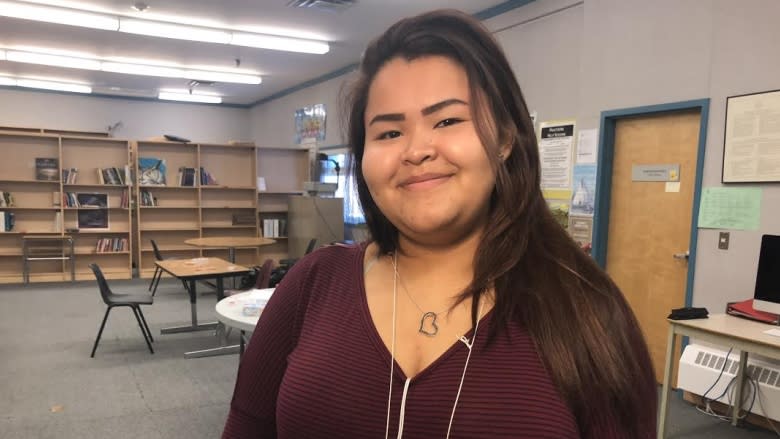'I want to see a change': How Fort Simpson is fighting suicide in the community
After four suicides in four months in Fort Simpson, N.W.T., last year, a contingent of 10 students from the community's high school are heading to Vancouver for a suicide-prevention conference.
Zaida Sanguez, 16, is in Grade 11 at Thomas Simpson High School.
"I want to see a change," she said. "I want to learn to actually help people and talk to them and help them through whatever they're going through."
Sanguez will be joined by Grade 12 student Isaac Isaiah, 17, who says he was deeply affected by the deaths over the summer.
One of his family members died by suicide, and wants to help people better understand they are not alone when dealing with mental illness.
"It's really sad to see how people find that's the only choice to go to," he said.
"I feel like we can help them more to get out of that hole of a situation they were in," he said. "I don't want to see another one lose a life just by their own actions."
The group is being sent with money from the Liidlii Kue First Nation, the N.W.T. Health Department, the N.W.T. Municipal and Community Affairs Department, and the Métis Nation.
Community steps up
The conference is the latest action people in Fort Simpson have taken to end suicide in their community.
One of those initiatives includes a caring circle that started in January. It's a monthly group aimed at tackling suicide and drug addictions proactively instead of in reaction to tragedy.
Officials with the Dehcho Divisional Education Council in Fort Simpson have also been working to help their students.
It held a mental health conference for students across the region earlier this month in response to the suicides last summer.
The school board has also opened Fort Simpson's high school after-hours on Fridays and Saturdays from 8 p.m. to midnight to give students a place to go.
The program, started in November, is called Lights On, and takes its lead from a similar program in Hay River.
"The program was set up as a response … to the kids just not having a place to go and nobody to talk to, and no place to really be a kid," explained Ramona Pearson, one of the program's supervisors who works with the Liidlii Kue First Nation.
She says the program gives youth a safe, warm place to focus their energy and gets them off the street.
In January, a mental health nurse was hired for all six Dehcho communities, based in Fort Simpson. But Sanguez and Isaiah say they'd like to see more counsellors in their community.
The territory's Health and Social Services Authority is working with communities across the Dehcho, including Fort Simpson, to improve mental health services, David Maguire, a department spokesman, said in an email to CBC News.
Urgent issues are being responded to in fewer than 90 minutes, and all referrals to mental health and counselling supports will happen within the same day, he said.
If you or someone you know is considering suicide in the N.W.T., call the confidential NWT Help Line at 1-800-661-0844. You can also call the Kids Help Phone at 1-800-668-6868 to speak to a counsellor.
There is also the First Nations and Inuit Watch help line at 1-855-242-3310.



